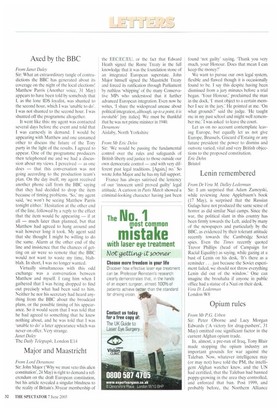Major and Maastricht
From Lord Deramore Sir: John Major (Why we must veto this alien constitution', 24 May) is right to demand a referendum on the draft European constitution, but his article revealed a singular blindness to the reality of Britain's 30-year membership of the EEC/EC/EU, or the fact that Edward Heath signed the Rome Treaty in the full knowledge that it was the foundation stone of an integrated European superstate. John Major himself signed the Maastricht Treaty and forced its ratification through Parliament by ruthless 'whipping' of the many Conservative MPs who understood that it further advanced European integration. Even now he writes, 'I share the widespread unease about political integration, although, up to a point, it is inevitable' tiny italics]. We must be thankful that he was not prime minister in 1940. Deramore Aisiaby, North Yorkshire From Mr Eric Delm Sir: 'We would be passing the fundamental control over the rules and safeguards of British liberty and justice to those outside our own democratic control — and with very different past legal traditions. [Aphid no.' Sc) wrote John Major and he has my full support.
France has always satirised the leniency of our 'innocent until proved guilty' legal attitude. A cartoon in Paris Match showed a criminal-looking character having just been found 'not guilty' saying, 'Thank you very much, your Honour. Does that mean I can keep the money?'
We want to pursue our own legal system, flexible and flawed though it is occasionally found to be. I say this despite having been dismissed from a jury minutes before a trial began. 'Your Honour,' proclaimed the man in the dock, 'I must object to a certain member I see in the jury.' He pointed at me. 'On what grounds?' said the judge. 'He taught me in my past school and might well remember me.' I was asked to leave the court.
Let us on no account contemplate leaving Europe, but equally let us not give Europe, Brussels. Giscard d'Estaing or any future president the power to dismiss and outvote varied, vital and very British objections to the proposed constitution.
Eric Dehn Bristol










































































 Previous page
Previous page